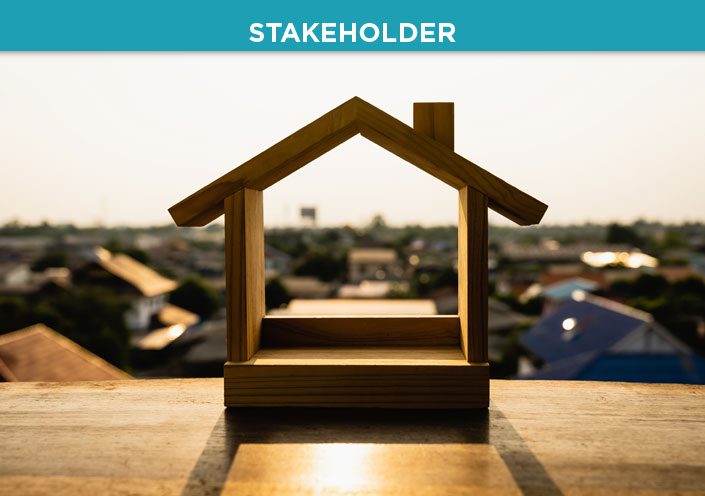
Starting in the mid-20th century, the open house event was a great way to show off new concepts, such as electric lighting and proper kitchens, and crowds were not uncommon. Viewber takes a look at where the idea came from, how it arrived in the UK, and how it could be part of your property marketing plan
The open house event was a favourite marketing tool among mid-20th Century American realtors, it remains that way today – but have you ever wondered where the idea came from, how it crossed the pond and how it could be part of your property marketing plan.
Let’s set the scene. It’s the 1950s and spring has sprung in West Loop, Chicago. ‘Exclusive contract’ realtors have finally seen off ‘curbstoners’ – the term given to opportunist salespeople trying to make a quick buck from a property sale – and property is feeling like a professional business.
A crowd has gathered outside a smart condo, buoyed by the offer of a cold glass of lemonade as well as a tour of a new home that’s just come to market. The doors are thrown open and the realtor greets the crowd, which is made up of the curious, the voyeuristic and serious purchasers.
Records show the first open house was held in America during the 1920s, but it went under the less catchy title of ‘open for inspection’. These events would last days – sometimes weeks – with properties staffed by a single realtor who would often be based in the home from 9am until 9pm so not to miss a prospect.
The events were a great way to show off new concepts, such as electric lighting and proper kitchens, and crowds were not uncommon.
“A true open house event, when no advance bookings are necessary, is a good method of instilling a sense of competition and urgency among potential buyers”
In the 1930s and 40s, realtors realised that people gathering at an ‘open for inspection’ event were a captive audience and if the property wasn’t quite right for them, purchasers could be persuaded to see other properties and cross-selling began.
The 1950s saw the name change from ‘open for inspection’ to open house.
The events were the perfect way to deal with the mass of buyers looking to purchase a home after the war ended.
Sundays become the prime day to hold open house events and free drinks were offered to incentivise visitors.
Today in America, both Saturdays and Sundays are devoted to open house events, with the marketing methods remaining largely unchanged, although there are reports of ever-more theatrical incentives, such as live bands and free massages!
While the history of open house events in the UK is not well documented, it is thought the trend caught on in the 1950s after estate agents heard about the success Stateside.
Anecdotal evidence suggests estate agent Richard Winkley held one of the first recorded open houses in the UK in the late 1970s. He used the marketing tool to help sell a luxury apartment in Knightsbridge, with a reputed 100 buyers attending.
Since then, estate agent Countrywide has gone as far as organising annual open house weekends, during which more than 900 sales branches encourage vendors to open their houses and buyers to visit multiple properties.
The events have seen thousands of properties open their doors across one 48-hour period which, in 2016, generated 24,500 viewings and almost 3,000 sales.
5 reasons to hold an open house event
It generates great social media content
In an article on the rise of the estate agent influencer, the author – Michele Gettins, the chief marketing officer at iamproperty – acknowledged that visual content is king when creating a social media following and gaining traction. Content filmed at open house events is a good way to build a modern property brand
It’s convenient for the vendor:
n open house event that’s confined to one day – or even just a few hours – means the vendor can get their property ‘viewing ready’ just the once, instead of repeatedly having to tidy up. It also means they don’t have to continually make themselves available (or scarce), which can be very disruptive
It’s a good gauge of the market
A well-publicised open house can help the seller and agent make several assessments. The numbers attending can help inform if the market is buoyant, if the price is too high or if the condition of the property is off putting
It creates a sense of competition
A true open house event, when no advance bookings are necessary, is a good method of instilling a sense of competition and urgency among potential buyers. If they attend and see other people also looking around, they will know they could be pipped to the property post. Open houses often result in multiple, quick offers and even bidding wars
It’s an efficient use of time
Frequent property visits can be a waste of an agent’s or auctioneer’s time, especially if those booking viewings are merely curious or speculative. An open house is an efficient way to let a large volume of people see inside a property – helping to reduce an agent’s travel time and carbon emissions, and increase desk time for more important tasks
Open house essentials
- Opt for a Saturday or Sunday when there’s more chance that people will be off work and free to visit an open house event
- Ideal opening hours are between 10am and 2pm but be prepared to extend the day if there’s high demand
- Choose between scheduled appointments or an ‘everyone is welcome’ approach
- Ensure there is a broad campaign advertising the open house, both digitally and in print
- Pay attention to appearances – declutter thoroughly, perform a deep clean, and ensure all curtains and blinds are open
- Don’t overlook kerb appeal as the front of a property is the first thing people will see – mow, weed, clean, tidy and repaint
- Carry out essential DIY and property maintenance before the open house
- Ensure your door number is visible and the doorbell works
- Make sure people can access any outside space but ensure the garden is tidy
- On the day, remove any valuable, sensitive and personal items
- Ensure every potential seller is asked for their details and feedback as they leave
- Act on feedback on matters such as presentation
Let Viewber help with an open house – either on their own or adding to your team.
Viewber has created a service specifically designed with open house events in mind, and benefits include:
- Flexible open houses durations from 30 minutes to 8.5 hours: have a Viewber run an appointment-based open house event on your behalf, choosing the duration that suits the number of enquiries and style of event
- Ensure you never miss a buyer: a Viewber can be an extra pair of hands, performing data capture and feedback gathering at ‘everyone is welcome’ open house events. This ensures all potential buyers are contacted, cross-selling opportunities are not missed and the vendor receives the most constructive feedback
- Availability seven days a week: our Viewbers can attend a property on Saturdays and Sundays – the times that are most popular among purchasers. This is beneficial for agents who don’t usually open over the weekend or who find themselves short staffed
- Ideal for ‘to let’ and ‘for sale’ properties: open house events work well for properties for sale and to rent. In terms of the latter, landlords and letting agents will find it beneficial to keep tenant disruption to a single day due to the prescribed access procedure
- ‘Open up & secure after’ service: there’s no need for agents to even leave their desk for an open house to go ahead. A Viewber can collect keys from a specified office or location, open up the property and secure it after the event has finished, returning the keys to the same place at the end
Housing Digital Stakeholder Viewber offers a wide range of property services to the UK Housing Sector, working collaboratively with organisations to offer, via an intuitive portal and app, access to a fully nationwide network of trusted, vetted and local ‘Viewbers’.
Image: sommart sombutwanitkul – Shutterstock
Read next: Northern Housing Awards 2023: The winners
Are you a social housing professional? Sign up for a FREE MEMBERSHIP to upload news stories, post job vacancies, and connect with colleagues on our secure social feed.



